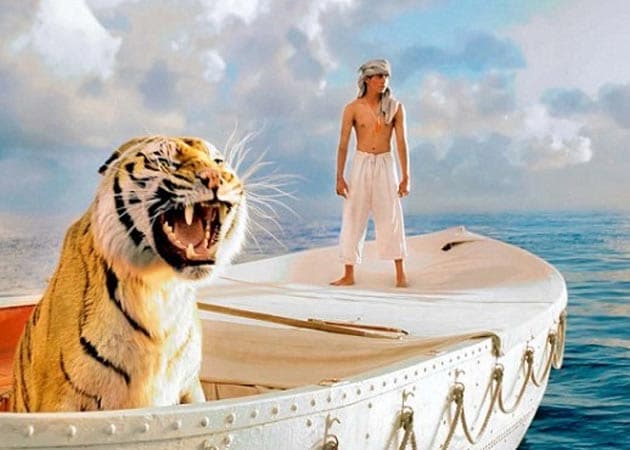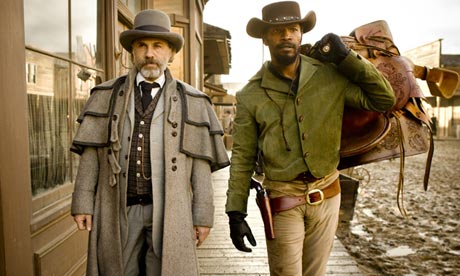The 85th Academy Awards Ceremony is an hour
away from airtime well underway so I guess that means it’s time to offer my
thoughts on the final two Best Picture contenders I’ve seen, Ang Lee’s Life of Pi and Quentin Tarantino’s Django Unchained. These films are lumped together only
incidentally but they do share a handful of prominent features. Both are the latest event movies (if any
movie can really be called that anymore) from modern auteurs who have managed
the increasingly rare feat of both popular and critical acclaim. Both fantasize an alternative history, of sorts:
the one, an encounter with nature on its own turf in the midst of a modernizing
world; the other, revenge for the abject racial subordination that continues to
assert itself a century and a half hence.
And both are basically good but way too damn long, nearly compromised by
excesses unique to their helmsmen – which is where they are, like Lee and
Tarantino, very different.
Life of Pi is 100 minutes of eye-popping wonder augmented by 20 going over what we learned today. Even Yann Martel, scribe of the original novel, has qualified his gushing approval by bemoaning Lee’s unambiguous ending. And indeed it, like the rest, is Lee’s: the maritime exploits of Pi the human and Richard Parker the tiger are absorbing in that just-shy-of-genteel way I’m assured those of his I haven’t seen share with those I have. Even an admirable attempt to épater with a POV piss-take (in both senses of the term) seems well within the well-established PG family film lingua franca. (The funniest parts – involving where the protags got their names – belong entirely to the source material.) That being said, even if a bit sterile, the passages at sea are just about the best evidence yet for the specious argument that digital 3D is truly the next ontological frontier for cinema – or some tunnel-vision idea of it, anyway. (Fittingly, the shipwreck scenes recall another technological milestone in the medium’s history, Carroll Ballard’s The Black Stallion.) But then Lee has to go and bookend these passages with present-day narration that pulls a reverse Big Fish on us and passes it off as metaphysical critique, reconstituting the whole squeaky-clean war-horse as a big steaming pile of horseshit.
Django Unchained deserves
a post of its own, especially in light of Grey’s
Anatomy star Jesse Williams’ impassioned
recent broadside against Tarantino’s neo-grindhouse genre mashup. I hope to address the piece at length at a
later date, but in brief, Williams pounces on the Weinstein’s cherished wunderkind’s lamentable talent for embarrassing public speech,
and questions whether he really deserves so much credit for returning slavery
to the American cultural conversation.
No, he doesn’t; no argument there.
But Williams rehearses the shopworn assumption that portraying atrocity in
the context of pleasure is always already complicit in evil. He goes on to juxtapose Inglourious Basterds with Django
and ask why the former wasn’t as stoked on pain and epithets. That assumes black slavery and the Holocaust
are somehow historically commensurate, which I’d argue they mostly aren’t. (Also, has Williams seen Inglourious’s opening farmhouse massacre?)
But more on that later.
My beef with Django is that,
even more than Death Proof, it
sometimes scans as a fully-funded spoof of Tarantino rather than the man
himself. The breathless carriage of
Christoph Waltz’s overstuffed lines is one instance, Herr Waltz’s otherwise excellent
work notwithstanding. The Mel
Brooks-cribbing proto-Klan sequence is another.
And I wonder how many minutes of exploding squibs could have gotten nixed without anyone really noticing? (I
protest it’s not bloody violence I'm losing my taste for, just the boring
kind.) On the ideological side of
things, I also wonder if Tarantino couldn’t have cut white trash a tiny bit of
slack. Don Johnson’s line about treating
Django “like Jerry” is the only reference made to the underspoken fact that
hillbillies had only a little more to gain from antebellum society than their
black, enchained counterparts. But I
guess asking Quentin Tarantino to flatter my Marxist biases is a little
like asking Ang Lee to scandalize me: in short, an exercise in futility.


No comments:
Post a Comment